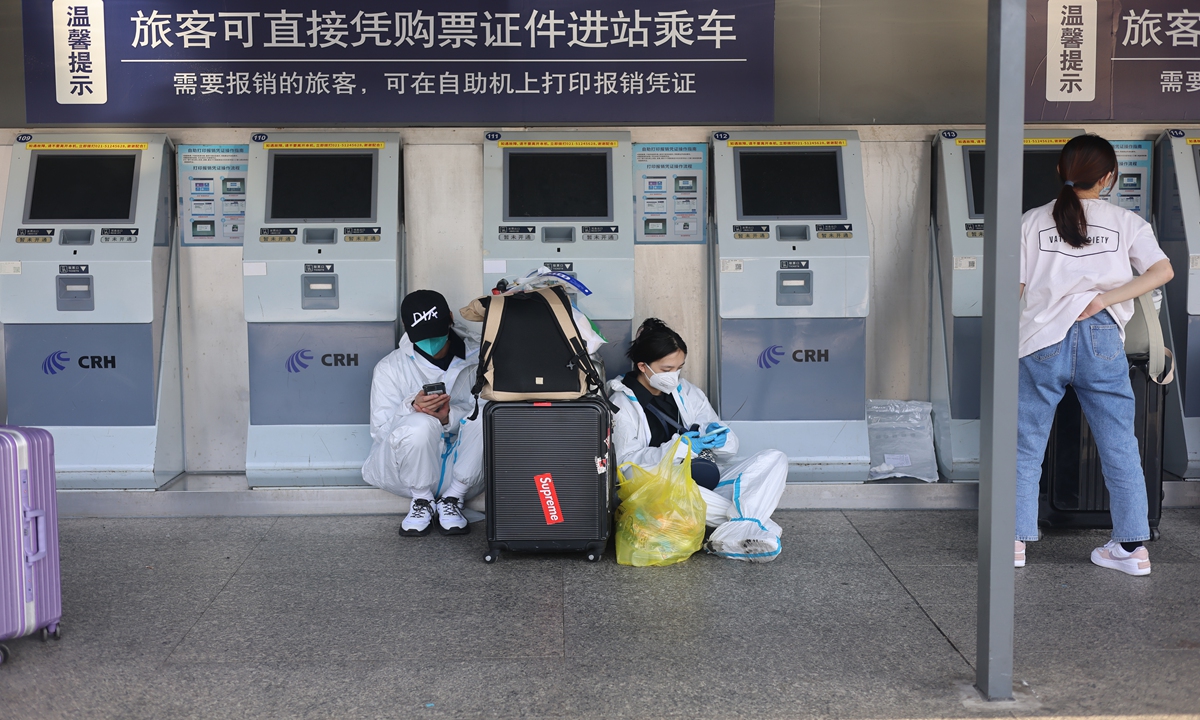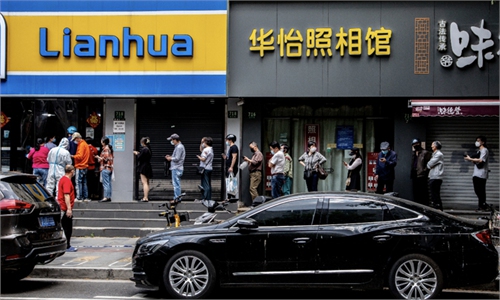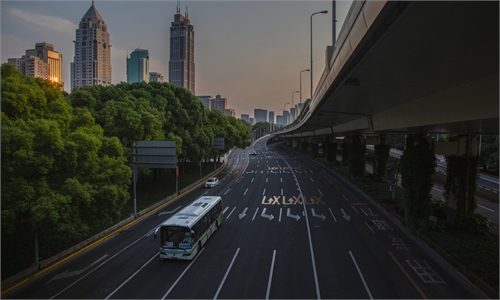
Residents prepare to depart from Shanghai Hongqiao Railway Station on Tuesday. Photo: VCG
Shanghai has witnessed mass departures as the city gradually eases COVID-19 restrictions after a six-week lockdown, allowing people to leave with approval, and increased trains to other cities. Yet for many travelers leaving the city, the journey was not as easy as hopping on and off trains or planes.
In a further lifting of COVID-19 restrictions, Shanghai police issued a notice on Wednesday, informing those who needed to leave the city by car, due to reasons related to work, study, seeking medical treatment and other urgent reasons, to apply for permits from certain authorities. Those authorities include schools, employers and community offices.
Permits for leaving Shanghai will be valid within six hours from the departure time residents specified.
The police stressed that in principle, Shanghai residents are asked not to leave unless necessary, in order to prevent the infection from spilling over.
Shanghai's railway authority added eight new trains to nearby cities such as Nanjing, Hangzhou, Ningbo and Hefei starting on Wednesday, in addition to 12 previous trains.
The railway authority also revealed that a total of 7,000 passengers left Shanghai via Hongqiao railway station on Wednesday, 1,000 more than the previous day. Most of those who left were university students.
Zhu Tingting, a student at Tongji University, who left Shanghai on Wednesday to go to her hometown in Jiangxi Province, told the Global Times that students need both approvals from their university and the community of the recipient city.
The railway station will check 48-hour valid nucleic acid tests before letting people in, said Zhu, noting the most difficult part of leaving was to obtain a train ticket, as it took her days of refreshing the website to finally get one.
Zhu said the railway station was almost as crowded as during Spring Festival travel rush. "Many were in hazmat suits and dragged several suitcases with them. But nobody paid any attention as everyone was focused on their own business, finding tickets, scrolling cellphones for travel information… we just want to go back home."
Yet she was among the lucky ones. Shanghai police said on Tuesday that six suspects had been arrested for allegedly scalping train tickets. One of them even charged an extra 2,200 yuan ($326) for two train tickets.
As many taxis and private vehicles are still forbidden to run on the streets, many in Shanghai face problems in getting to train stations and airports. Another passenger surnamed Li told the Global Times that one can turn to a car-hailing app, but it is very difficult to book one. "The fare is also more than usual."
A video of a deliveryman ferrying a passenger for 20 kilometers to Hongqiao station on Tuesday night went viral on the internet, receiving 140 million clicks.
The Shanghai municipal government said in a Monday conference that it will gradually resume taxi and car-hailing services.
Another person surnamed Zhi, who had gone to Shanghai for business and was stranded there when the government began a lockdown, left on Tuesday. He told the Global Times that his home destination community refused to have him back, fearing the risk of virus transmission. So he turned to Hangzhou, Zhejiang Province which accepted him and offered him free isolation of 14 days.
Many cities also issued quarantine policies for returnees from Shanghai. For example, Changsha, Hunan Province said on Sunday that people coming to the city from Shanghai should register their journey with places they will stay in Changsha beforehand. They will be transported to a quarantine center via a closed-loop system upon arrival, and then face seven days of collective quarantine and another seven days of health monitoring at home.
A netizen left a message for the Wuhan government recently, urging it to scrap free isolation for people coming to Wuhan, Hubei Province citing concerns of financial burdens and risks of triggering an outbreak.
In a heart-warming response, the Wuhan government said that it will strictly implement anti-virus policies. Wuhan received nationwide help when it was facing the onslaught of COVID-19 in 2020, and its people should be grateful, said the government's response, noting that there should be no differentiated treatment and no discrimination against others.



